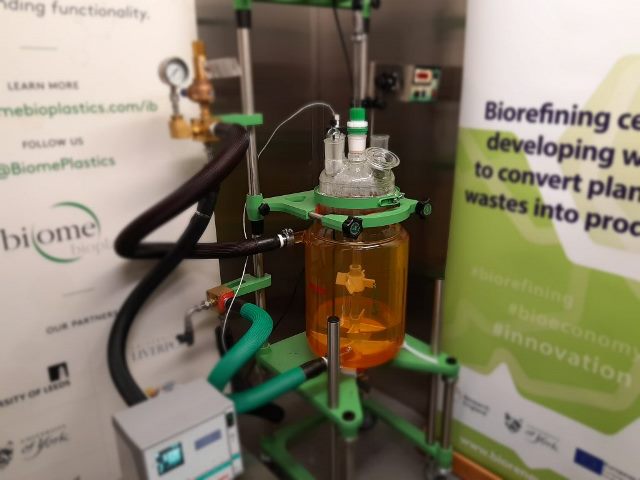Biome Bioplastics and the Biorenewables Development Centre (BDC) have collaborated with the Green Chemistry Centre of Excellence (GCCE) to develop and install a new polymerisation reactor at the BDC to boost the development of novel bioplastic polymers.

Image: The new specialist polymerisation reactor will enable the scale-up of the manufacturing process to produce tens of kilograms of new bioplastics. Photo: courtesy of Biome Bioplastics.
Part funded by the University of York‘s Higher Education Innovation Fund (HEIF), the new polymerisation reactor for bioplastics will allow the scale-up of the manufacturing process to produce tens of kilograms of new materials for further technical and commercial evaluation.
GCCE post-doctoral research associate James Comerford said: “The developed materials have tuneable biodegradability which allows us to tailor the properties to fit its application, in particular, sustainable packaging of perishable products.
“The scale up to kilogram quantities is a huge step forward in getting ideas out of the laboratory and into the real world.”
Biome has worked with the University of York’s Biology and Chemistry departments and the BDC on a translational research and development project, over the last three years.
With the support of Innovate UK’ funding, the partnership has worked to create and assess a family of novel and bio-based plastics, which are better functional in their performance and biodegradable.
Bio-based plastics, which are similar in structure to traditional oil-based plastics, include long chains of monomer molecules joined together by a process known as polymerisation.
The building blocks for bio-based plastics are gathered from renewable materials such as agricultural waste, plants and trees, while traditional oil-based plastics use monomers derived from finite fossil fuels.
Biodegradable plastics will be degraded at the end of their useful life to carbon dioxide and water via natural microbial and fungal decay in a controlled waste management environment such as industrial composters and anaerobic digesters.
Biome business development manager Krisztina Kovacs-Schreiner said: “This investment in the scale-up of our novel polyester bioplastics is an important next step for Biome’s development work. We are delighted to be extending our work with BDC and the broader teams at the University of York.”
Based in Southampton, Biome Bioplastics manufactures a range of high-performance and plant-based bioplastics, which are industrially and home compostable.
